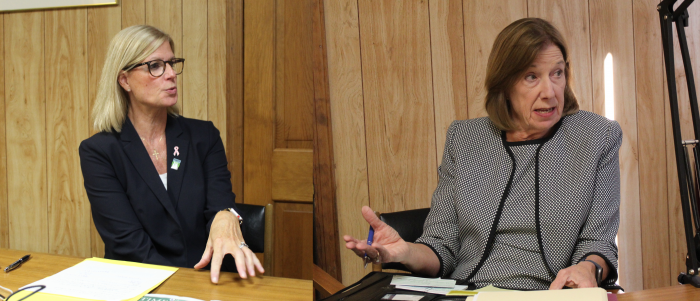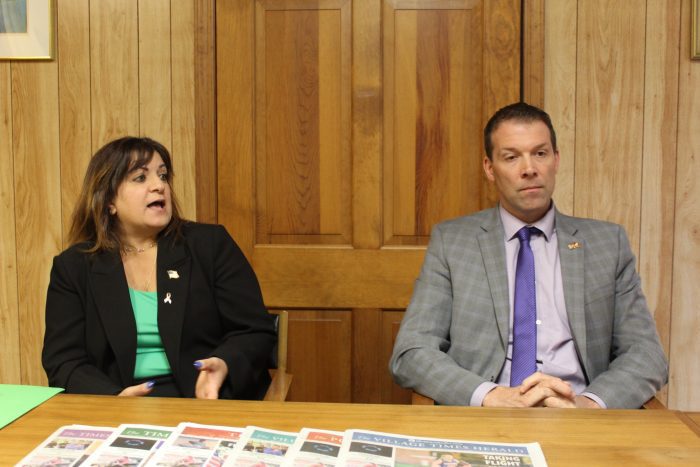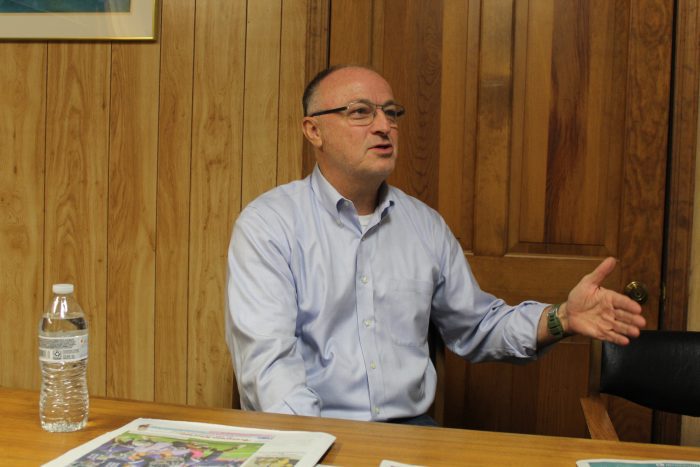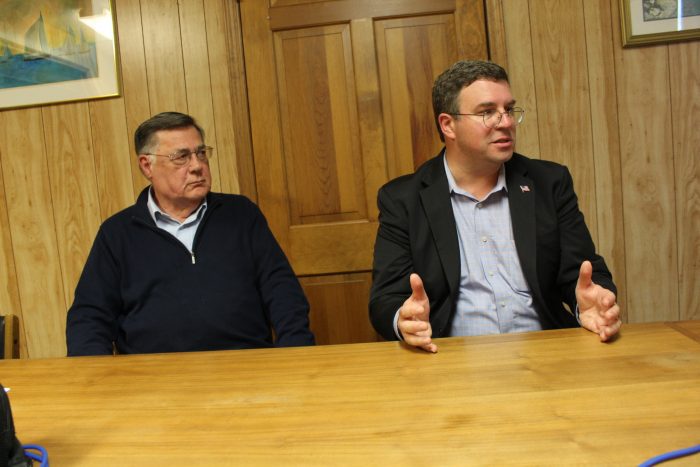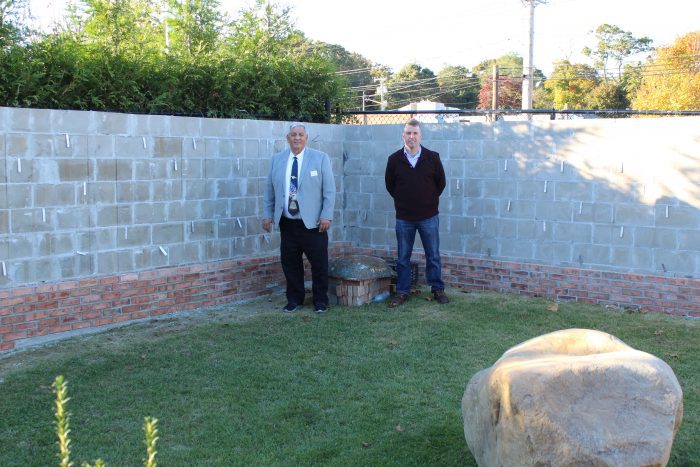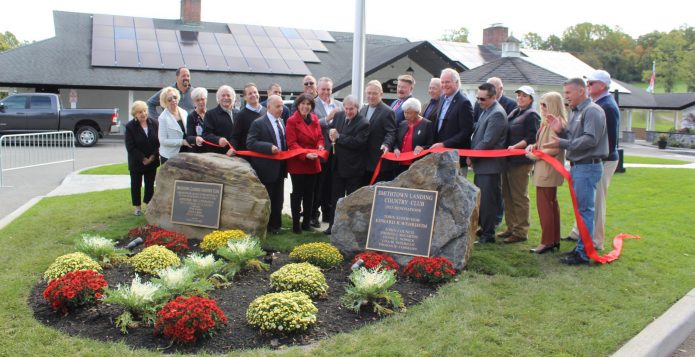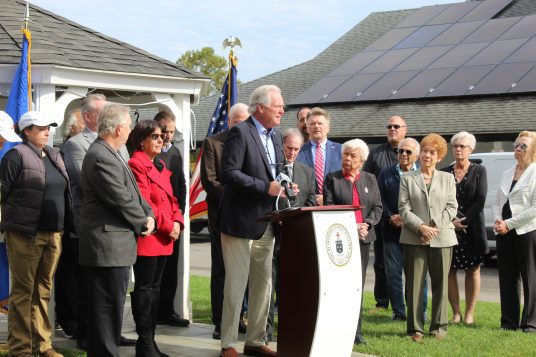In the race for Suffolk County’s 4th Legislative District, incumbent Legislator Nick Caracappa (C-Selden) is running virtually uncontested.
Caracappa’s Democratic Party challenger, Tim Hall (D-Selden), is not openly campaigning and declined to participate in an office debate with TBR News Media. One-on-one with the incumbent, who currently serves as majority leader within the county Legislature, Caracappa outlined various quality-of-life concerns within the 4th District, touching upon the ongoing countywide wastewater debate, economic development, homelessness and finances.
Wastewater
This year’s county elections are happening beneath the cloud of the Water Quality Restoration Act, a proposed 1/8-penny sales tax to finance wastewater infrastructure in Suffolk County. Along with the Republican Party caucus, Caracappa voted no, pointing to several perceived deficiencies within the legislation.
He suggested that the debate over wastewater infrastructure is a matter of finding the correct balance between laying down seed funds for large-scale sewer projects and financing innovative/alternative septic systems, known as IA systems.
“The most critical flaw of that legislation was the distribution percentages,” he said. “No less than 75% would go toward IA systems, and the rest would go toward sewers.”
Caracappa contended that IA systems have not been requested or used by LD4 residents, saying that this technology is necessary for places along the East End that lack the density to support sewers.
“We have these hundreds of millions committed to shovel-ready projects,” he said. “Planning and development stages are already done. All we’re waiting for is to get the shovels in the ground.”
But getting those shovels in the ground, the legislator noted, requires significant state and federal subsidization. To tap into those large pots of cash, he said a reworded wastewater protection plan would be appropriate, devoting a much larger percentage toward sewers.
“We’re talking about hundreds of millions of dollars” to complete full-scale sewer projects, Caracappa said. “We don’t have that kind of money in Suffolk County, but we do have the tens of millions” to generate the local match necessary for full-scale subsidization.
He added, “I will continue to fight for legislation for the projects that are needed at this time,” namely for sewers.
Middle Country Road
Amid the countywide debate over wastewater, there remains the local matter of introducing sewers into the Middle Country Road corridor, extending a sewer line from Lake Grove to Coram.
Caracappa stated that various businesses and restaurants are interested in entering the Middle Country area, though the existing wastewater infrastructure cannot adequately accommodate these establishments. “Because of the lack of sewers, we can’t facilitate their waste needs,” leading to a local decline.
He said that new sewers would revitalize the Route 25 commercial strip, enhancing the quality of life for residents.
“The sewers, in this case, are for downtowns, for economic development and for new businesses coming in,” he said, adding that the project aims to incentivize “knocking down those small, shuttered buildings and attracting businesses that can come in.”
He pointed to downtowns such as Patchogue, Babylon and Sayville as a model for downtown development along Middle Country Road. “All those downtowns are thriving, and the common denominator is that they have sewers in the ground.”
He regarded sewers as a regional economic development tool. “From putting in the sewers to roadways to drainage to new businesses coming in, they’re going to need employees, and it’s going to create jobs,” Caracappa said. “Jobs give people a reason to stay.”
Affordability/housing
In attracting new businesses into the Greater Middle Country area, Caracappa said there would be several steps toward overseeing the planning for new developments.
“We have to recognize the housing issues here in Suffolk County,” he said. “That’s why I’m a staunch advocate and supporter — and I generated two bills signed into law — that for each development that’s built and that seeks county subsidies, they have to set aside a certain amount of affordable housing for veterans and those in our special needs community.”
Due to the high cost of living in Suffolk, he noted that many young people are struggling to find a place to live. He proposed that county subsidization should come with the caveat of setting aside workforce housing for those earning below the average median income.
Developers “may not get as rich or as quick as they want, but if they’re going to get county taxpayer funding, then there has to be a return on that investment,” he added. “That’s true workforce housing.”
Budgets
With long-term economic uncertainty and a county budget increasingly unstable, Caracappa offered his approach to reigning in the county’s budget. He highlighted some of the principles he said have guided the Republican majority in the county Legislature, noting efforts to improve the county’s bond rating and lower interest rates.
“The first initiative we took is to stop bonding everything,” he said. “We have cash on hand, so we stopped bonding out projects that were $50,000 or less,” adding, “Taking out a bond on $50,000 makes no fiscal sense because you’re going to pay more on interest than you are on the initial loan.”
He also advocated against appropriating funds for projects and programs with minimal return on investment. He supported filling vacant positions within the government and raising salaries for existing county employees.
The majority leader added that the county Legislature must consider a “full circle” approach to economic sustainability, exploring ways to keep young people living and working in Suffolk, where their money can be returned to the community.
“You have to create opportunities here, so they can work here, collect a salary here and recycle that money back into” Suffolk County, he noted.
Homelessness
Amid these fiscal and regional economic challenges, LD4 communities continue experiencing pockets of homelessness, notably in and around Coram.
In addressing the plight of homelessness, Caracappa supported a multipronged effort, tailoring unique intervention strategies to different cases.
“We have to provide opportunities,” he emphasized. “A lot of these homeless people are veterans or people who lost their jobs due to COVID. … For others, there are mental health issues, and we have to provide opportunities for that and get them treatment.”
He referred to homelessness as a “very difficult issue,” especially given the challenges within the shelter system. He noted, “There’s never going to be an answer to all of it because not everybody wants to be helped.”
Given the influx of migrants entering New York state, Caracappa expressed concerns over its implications on local homelessness.
“Promises that are being made to these individuals who are crossing our border are fundamentally and outright lies,” he said. “They’re being promised an opportunity for a better life, and they’re all ending up in gymnasiums and warehouses.”
He added, “It’s a false promise for a false life that cannot be provided. I will not support having the taxpayer money of Suffolk County residents — who are already struggling day-to-day to help their own families — to provide for these other families.”
Political influence
When asked about the role of outside stakeholders in county government, Caracappa responded that these influences did not affect him personally.
He cited the wastewater bill as a moment in which he received considerable pushback from stakeholder groups, such as unions and environmentalists.
“My job is to protect and serve those in Suffolk County — be their voice and present legislation that’s going to benefit them,” he said.


